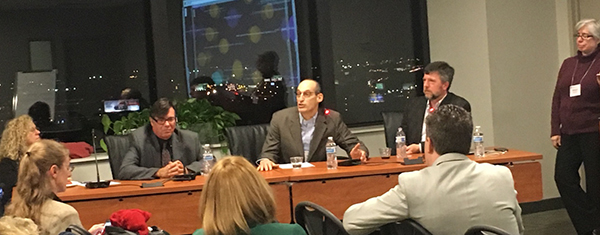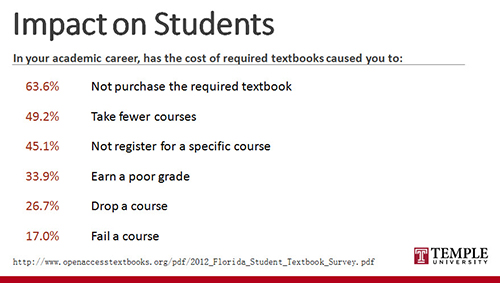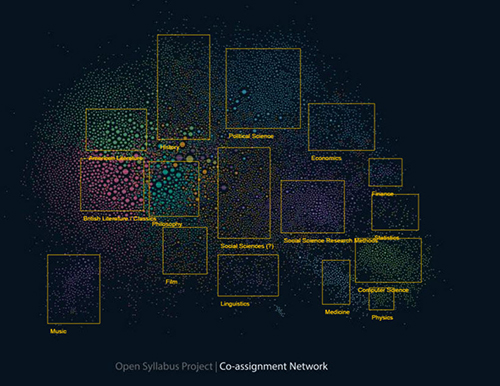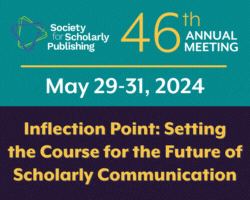
Panelists from the Philadelphia regional event included, (left to right) Mary Rose Muccie, speaker, Temple University Press; Steven Bell, speaker, Temple University; Joe Lucia, speaker, Temple University; Joe Karaganis, speaker, Open Syllabus Project; and Rebecca Kennison, moderator, K|N Consultants (standing). (Photo Credit: Nicola Hill)
The Society for Scholarly Publishing (SSP) held its first Philadelphia-based regional programming event, “Open Access in Education: Open Educational Resources (OERs) and the Open Syllabus Project in the Context of Scholarly Publishing”, on December 7, 2016, at the American Association for Cancer Research (AACR). The format included a period of refreshments and networking, followed by a one-hour speaker panel, with additional networking time at the end. The view of Center City Philadelphia from the 15th floor of AACR was the perfect backdrop for the evening’s conversation.
The focus of the event was a four-speaker panel including Joe Lucia (Dean of Libraries), Mary Rose Muccie (Executive Director of Temple University Press) and Steven Bell (Associate University Librarian for Research and Instructional Services) from Temple University, and Joe Karaganis, Director of the Open Syllabus Project at Columbia University. The moderator for the evening was Rebecca Kennison, Principal at K|N Consulting and Co-founder of the Open Access Network.
Lucia opened the panel by providing context for the OER work at Temple University: for Temple, “open” is mainly a philosophical decision rather than an economic one. Libraries, faculty, and presses each play a role in open access, and there are growing alliances between presses and research libraries that have created hybrid “publishing” activities that cross traditional boundaries. The creation of Scholarly Communications programs and Digital Scholarship Centers are evidence of a new framework that is emerging in an ecosystem that seems, at least from within Academia, to be out of balance. OERs are one part of this new avenue that libraries, faculty, and presses are now exploring.
Next, Bell discussed open textbooks as one type of OER. Since 1978 the cost of textbooks has increased 812%, and today the most asked question at the library during the first week of classes is “Do you have my textbook?” The 2012 Florida Student Textbook Survey found that the cost of required textbooks had a significant impact on students:

Bell noted that sustainability and affordability in higher education are drivers of the open textbook initiatives such as The Alternative Textbook Project at Temple Libraries, the UMass Library Open Education Initiative, the Rutgers Open and Affordable Textbooks Project, and OpenStax, a nonprofit based at Rice University.
Muccie then described the challenges that Temple University Press faces, particularly the question of how to foster disciplines that use long-form scholarship – humanities and qualitative social sciences – in an environment where sales of published long-form works are declining. There is also the challenge of communicating the value and relevance of the Press to the University, and she sees “OERs as Opportunity.” OER projects are an avenue through which the Press can continue to help support student learning, to partner with faculty on content creation, to further integrate the scholarly communication and library publishing programs, and to share expertise. That expertise can come in the form of development (e.g. press acquisitions editors sharing experience on how to develop coherent projects), peer review, rights and permissions, editorial and production knowledge, and Print on Demand experience (if print is desired).
However, OERs go beyond books – they include all types of teaching and learning materials, including tutorials, quizzes, slide decks, full courses, course modules, lectures, and syllabi. Karaganis from The American Assembly at Columbia University was the panel’s final speaker, and he went directly into a live (and lively) demo of the beta version of the Open Syllabus Explorer (explorer.opensyllabusproject.org), which uses a data mining approach across almost one million syllabi from universities around the country to provide a free searchable database. Search on a specific text to find out not just how often it appears in a course syllabus, but what other texts are most often assigned with it. Don’t want to browse text? How about exploring a citation graph?

As administrators look to expand promotion and tenure criteria beyond traditional citation measures, the inclusion of a publication in a formal course syllabus could be a powerful, alternate indicator of the quality and value of that work within teaching/pedagogy.
The Q&A to end the formal panel session was led by Kennison, the moderator, after which additional informal discussions continued between speakers and attendees until the close of the event.
The SSP Community Engagement Committee in Philadelphia and other regions (Boston, New York City, Washington DC, Raleigh/Durham NC, San Francisco, and Chicago) will be scheduling additional events for 2017, and will be exploring speaker topics that are of importance to the full range of participants in the scholarly communications community (publishers, librarians, administrators, researchers, and funders). Stay tuned!
Helen Szigeti, Program Director, Society for Scholarly Publishing
Emma Sanders, Managing Editor II, Taylor & Francis



Join the Conversation
You must be logged in to post a comment.